Filter by

Arsenic in the Environment: Bridging Science to Practice for Sustainable Deve…
The Congress and Exhibition Series ""Arsenic in the Environment"" offers an international, multi- and interdisciplinary discussion platform for research and innovation aimed towards a holistic solution to the challenges posed by the environmental toxin arsenic, with global societal impact. The Congress has focused on cutting edge and breakthrough research in physical, chemical, toxicological, m…
- Edition
- -
- ISBN/ISSN
- 9781032329284,
- Collation
- oer.unej.ac.id
- Series Title
- Arsenic in the Environment - Proceedings,
- Call Number
- -
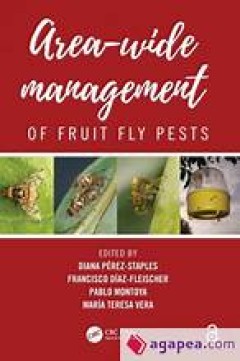
Area-Wide Management of Fruit Fly Pests
Fruit fly (Diptera: Tephritidae) pests have a profound impact on horticultural production and economy of many countries. It is fundamental to understand their biology and evaluate methods for their suppression, containment, or eradication. Area-Wide Management of Fruit Fly Pests comprises contributions from scientists from around the world on several species of tephritids working on diverse sub…
- Edition
- -
- ISBN/ISSN
- 9781000711264
- Collation
- oer.unej.ac.id
- Series Title
- -
- Call Number
- -

Advances in identifying GM plants: toward the routine detection of 'hidden' a…
In 2018 the Court of Justice of the European Union recalled that organisms with genomes modified by artifactual techniques should be considered GMOs under European regulations. GMOs derived from cultures of cells isolated in vitro or from new genomic techniques must therefore be traceable. This chapter reviews the various technical steps and characteristics of those techniques causing genomic a…
- Edition
- -
- ISBN/ISSN
- 9781801462044
- Collation
- oer.unej.ac.id
- Series Title
- Burleigh Dodds Series in Agricultural Science,
- Call Number
- -
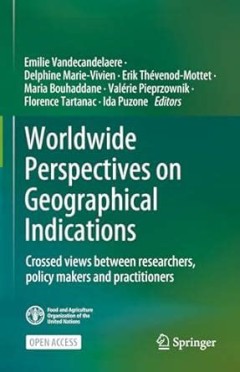
Worldwide Perspectives on Geographical Indications = Crossed views between re…
Geographical Indications (GI) are distinctive signs that associate products of quality and reputation with their place or area of production and thereby help identify and distinguish such products on the market. In July 2022, the Food and Agriculture Organization of the United Nations (FAO) and the Centre de coopération internationale en recherche agronomique pour le dével oppement (CIRAD)…
- Edition
- -
- ISBN/ISSN
- 9783031716416
- Collation
- XXII, 394 hlm; ill., lamp.,
- Series Title
- -
- Call Number
- -
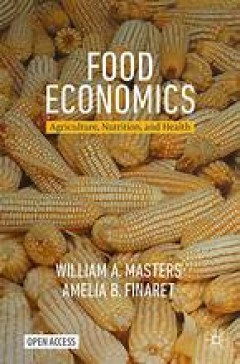
Food Economics
Food Economics provides a unified introduction to the economics of agricultural production, business decisions, consumer behavior, and the government policies that shape our food system. This open access textbook begins with economic principles derived using graphical techniques to explain and predict observed prices, quantities, and other outcomes as a result of individual choices influence…
- Edition
- 1
- ISBN/ISSN
- 978-3-031-53840-7
- Collation
- oer.unej.ac.id
- Series Title
- Palgrave Studies in Agricultural Economics and Food Policy
- Call Number
- -

Resilience and Food Security in a Food Systems Context
This open access book compiles a series of chapters written by internationally recognized experts known for their in-depth but critical views on questions of resilience and food security. The book assesses rigorously and critically the contribution of the concept of resilience in advancing our understanding and ability to design and implement development interventions in relation to food securi…
- Edition
- -
- ISBN/ISSN
- 978-3-031-23535-1
- Collation
- oer.unej.ac.id
- Series Title
- Palgrave Studies in Agricultural Economics and Food Policy
- Call Number
- -

Transforming Food Systems for a Rising India
This open access book examines the interactions between India’s economic development, agricultural production, and nutrition through the lens of a “Food Systems Approach (FSA).” The Indian growth story is a paradoxical one. Despite economic progress over the past two decades, regional inequality, food insecurity and malnutrition problems persist. Simultaneously, recent trends in obesity …
- Edition
- 1
- ISBN/ISSN
- 978-3-030-14409-8
- Collation
- oer.unej.ac.id
- Series Title
- Palgrave Studies in Agricultural Economics and Food Policy
- Call Number
- -

Fostering transformation and growth in Niger's agricultural sector
"For Niger, the development of agriculture is essential to strategies to raise incomes and eradicate poverty in a sustainable manner, without further depleting its natural resource base. While traditional approaches to agricultural development have emphasized food security and have been rather technology focused, African countries are increasingly emphasizing the role of innovation in developme…
- Edition
- -
- ISBN/ISSN
- 978-90-8686-873-5
- Collation
- oer.unej.ac.id
- Series Title
- -
- Call Number
- -
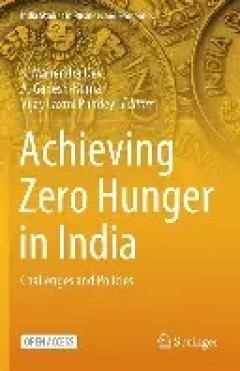
Achieving Zero Hunger in India Challenges and Policies
This open access volume discloses rich set of findings and policy recommendations for India towards achieving the SDG 2.1 target of zero hunger by 2030. Through its fourteen chapters, it takes an integrated approach by examining diverse aspects of food and nutrition security through multidisciplinary lens of Agricultural Economics, Nutrition, Crop Sciences, Anthropology and Law, while being roo…
- Edition
- -
- ISBN/ISSN
- 978-981-99-4412-5
- Collation
- IX, 344
- Series Title
- -
- Call Number
- -
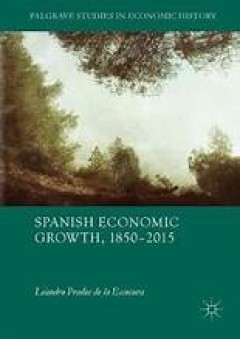
Spanish Economic Growth, 1850–2015
This book is open access under a CC BY 4.0 license. This text offers a comprehensive and nuanced view of the economic development of Spain since 1850. It provides a new set of historical GDP estimates for Spain from the demand and supply sides, and presents a reconstruction of production and expenditure series for the century prior to the introduction of modern national accounts. The author …
- Edition
- 1
- ISBN/ISSN
- 978-3-319-58042-5
- Collation
- oer.unej.ac.id
- Series Title
- Palgrave Studies in Economic History
- Call Number
- -
 Computer Science, Information & General Works
Computer Science, Information & General Works  Philosophy & Psychology
Philosophy & Psychology  Religion
Religion  Social Sciences
Social Sciences  Language
Language  Pure Science
Pure Science  Applied Sciences
Applied Sciences  Art & Recreation
Art & Recreation  Literature
Literature  History & Geography
History & Geography